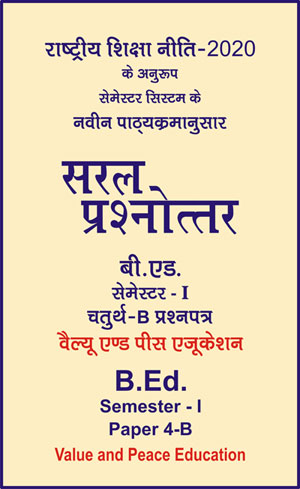|
बी एड - एम एड >> बी.एड. सेमेस्टर-1 प्रश्नपत्र-IV-B - वैल्यू एण्ड पीस एजुकेशन बी.एड. सेमेस्टर-1 प्रश्नपत्र-IV-B - वैल्यू एण्ड पीस एजुकेशनसरल प्रश्नोत्तर समूह
|
5 पाठक हैं |
||||||
बी.एड. सेमेस्टर-1 प्रश्नपत्र-IV-B - वैल्यू एण्ड पीस एजुकेशन (अंग्रेजी भाषा में)
Question- Why Moral Conflict is intractable? Discuss it in detail.
Answer -
Because of its deep-roots, moral conflicts tend to be intractable and long-lasting. Parties to such conflict often have great difficulty in describing the substantive issues in shared terms. Because they are arguing from different moral positions, they disagree about the meaning and significance of the important issues. This makes negotiation or compromise extremely difficult in and of itself.
Resolution becomes even more difficult when parties disagree not only about substantive issues, but also about which forms of conflict resolution are morally right, aesthetically preferred, and politically prudent. Parties may have very different ideas about how to gather information, arrive at a conclusion, make a decision, and deal with uncertainty.
Over the course of conflict, the original issues often become irrelevant and new causes for conflict are generated by actions within the conflict itself. This is because in moral conflict, when groups try to act consistently with what they believe is morally good and just, they “prove” to the other side that they are fools or villains. Thus, the means by which the parties seek resolution often just provoke further conflict. As the conflict continues, substantive issues are largely forgotten and "the other side’s means of dealing with the conflict is itself the force that drives the conflict."
These may include religious differences, cultural differences or differences in upbringing.
Values-based conflicts are particularly pervasive in public policy. Indeed, nearly all public (policy) controversies entail divergent beliefs about what is right and what is wrong, what is just and what is unjust. Many policy decisions are essentially choices among competing values. Simply consider how :
(i) Efforts to promote equal opportunity might result in conflicts among values such as efficiency, justice, equality, diversity, merit, and individual achievement;
(ii) Crime prevention policies might trigger competition among values such as liberty, safety, due process, equity, effectiveness, access, and justice; and
(iii) Domestic security policies might produce conflict among values such as knowledge generation, information sharing, confidentiality, privacy, civil liberties, individual rights, and safety.
Effects of Moral Conflict
Not surprisingly, moral conflict often has harmful effects. Participants in moral conflict often behave immorally, even according to their own standards of behaviour, because they believe the actions of their enemies force them to do so. If a group is regarded as morally depraved, its members may come to be regarded as less than human and undeserving of humane treatment. The demonization or dehumanization of one's opponent that often occurs in moral conflict paves the way for hateful action and violence. It often leads to human rights violations or even attempts at genocide, as parties may come to believe that the capitulation or elimination of the other group is the only way to resolve the conflict.
|
|||||













